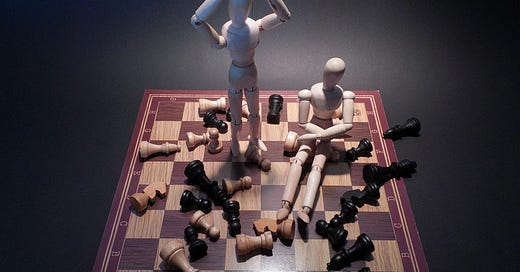When You're Up Against Someone Playing Chess, You Better Not Be Playing Checkers.
I was pretty stoked when I read Rob Schwartz’s piece on Rob Schwartz Helps. The premise is so spot on and so important to arguably every facet of life. It posits the idea that in a world where so many of us are playing checkers, the smart money is on the chess players. Checkers people react to things. Politics. Sports. Getting fired. Walking away from Cannes with a suitcase full of Lions. Something happens. We react. Wash. Rinse. Repeat. But chess people, they take the long view, always thinking several more moves ahead. Reacting in a way that sets them up for a future successful outcome. Here’s Rob’s post.
Russian Paul makes about $500 a day.
You’ll find him at Union Square or Washington Square Park in NYC.
He’s a chess hustler.
There are plenty of chess hustlers in NY. They are often looking for opponents. $5 a game.
One of the reasons there’s usually a seat open for a street chess game comes down to math: not that many people play chess.
Most people play checkers.
On the street. And in work and life.
Let me be more specific. Most people operate like they’re playing checkers—reacting to whatever lands in front of them, jumping when they have to, moving one square at a time.
But the real winners? They’re playing chess.
Checkers, invented around 3000 BCE in ancient Mesopotamia, is fundamentally reactive. You respond to your opponent’s moves.
Chess, emerging in 6th century India as “chaturanga,” demands you think three moves ahead, control the center, sacrifice pieces for position.
In your career you’ll note: checkers players wait for opportunities. Chess players create them.
Checkers players ask for raises. Chess players become irreplaceable.
Checkers players compete for existing positions. Chess players invent their own career paths.
Checkers players network when they need jobs. Chess players build relationships before they need them.
There’s a pattern here.
Stop reacting. Start planning. Build systems, not just responses. Develop people, not just projects. Think quarters ahead, not just quarters behind.
The irony? Life is actually backgammon—part strategy, part dice roll.
But chess teaches you to stack the odds, to position yourself so that when fortune smiles (or frowns), you’re ready.
What’s your next move?




